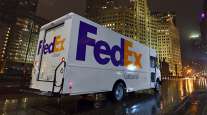Third Time's a Charm for UPS at Christmas, But FedEx Stumbles

CHICAGO — After two consecutive years of problems during its holiday peak package season, UPS delivered on time at Christmas this year, while its main rival, FedEx, had a last-minute stumble that left some gifts undelivered until after the holiday.
"It seems like the third time's a charm for UPS," said Kent Winegar, portfolio manager at Austin, Texas-based Terry McDaniel & Co., which manages assets of around $900 million and holds nearly $15 million in UPS stock. "But if e-commerce keeps growing at such a rapid rate, we'll see how they do next year."
A late surge in e-commerce orders and bad weather in 2013 left an estimated 2 million packages undelivered on Christmas Eve, mostly stranded in Atlanta-based United Parcel Service Inc's package network. Arch rival FedEx Corp experienced problems on a smaller scale.
UPS and FedEx rank No. 1 and No. 2 on the Transport Topics list of the Top 100 largest for-hire carriers in the United States and Canada.
Last year, UPS spent $500 million, boosted seasonal hiring and worked with retailers to forecast package volumes that failed to materialize and overspending hurt fourth-quarter earnings. FedEx did not experience problems that year.
This year UPS focused on what spokesman Steve Gaut described as a "disciplined approach" to peak season that included pulling delivery dates forward on days when it had excess capacity in its network and informing retailers of hard cutoff dates for packages to make it by Christmas, using UPS' cheaper ground delivery service.
As a result, many retailers informed customers free shipping would end the week before Christmas — as shipping by air would be too expensive.
Noelle Sadler, chief marketing officer at online clothing retailer LuLu's, said the firm stopped free shipping over a week before the holidays because it was "hamstrung by UPS and have to follow their rules."
UPS' network was snarled up for about a week after Black Friday particularly in California, Texas and the Northeast, but focused its resources to catch up, spokesman Gaut said.
In the week running up to Dec. 24, UPS had an on-time delivery rate of between 97% and 98%, he said. The company's on-time rate on a normal day, when daily package volumes are around half those during peak, is between 98% and 99%.
FedEx, on the other hand, struggled and said in a statement this was because of a "surge of last-minute e-commerce shipments."
The company said late packages were delivered Dec. 26, but did not provide any details on the number of packages that were late or in what parts of the United States.
Additional reporting by Nandita Bose; Editing by Tom Brown




